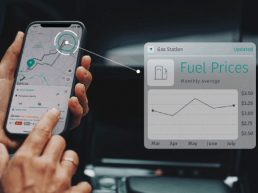the why
How we assist companies with their Location Intelligence
More than half of all enterprises say that Location Intelligence is either critically important or very important to achieving their goals. As digital services become increasingly popular, the importance of location will continue to grow for both businesses and customers.
What is Location Intelligence
Location Intelligence is the process of deriving strategic insights from geospatial data. It involves much more than simply placing data points on a map. Location Intelligence takes location-specific information and makes it a key part of business decision making.
Today, organisations have a wealth of data at their disposal from transaction information to social media posts. Even so, adding geographic context is hugely beneficial for achieving business goals, providing insights that can help boost engagement and allow companies to deliver a more personalised customer experience.
How the HERE platform boosts your company's performance
Decrease the cost of running your fleet by 20%
Reduce re-routing time by up to 90%
More Sustainable
What types of data are used for Location Intelligence?
Location Intelligence leverages all types of data sets – including internal business data and publicly available information. This could involve addresses, either in plain-text form or as latitudinal and longitudinal coordinates. While the former is more commonly used, the latter does have the advantage of being standardised. Address information can be inconsistent – so organisations may need location intelligent software that is capable of processing unstructured data in order to collate and analyse it.
Other forms of Location Intelligence data could include footfall, traffic density, census information, climate data, or consumer spending analysis. The particular form that your Location Intelligence will take is likely to depend on your specific business area and needs. As mentioned previously, businesses won’t necessarily have to collect all their Location Intelligence data from scratch themselves. Many well-known mapping tools use open data that mean they make information publicly available – so businesses are free to use it in their own Location Intelligence analysis.
Fleet Management
With the rise of eCommerce and other digital services, more businesses than ever depend on having trucks on the road to keep their customers satisfied. However, when those trucks leave a warehouse or depot, it can be very difficult to follow their progress or identify problem areas. That’s where location intelligence comes into play. Real-time location data can greatly improve a company’s fleet management by increasing visibility and optimising vehicle usage. Location Intelligence can improve route planning, provide more accurate arrival estimates, and boost both driver and customer satisfaction levels.


Geomarketing
Another area where Location Intelligence is having a major impact is geomarketing. Traditional marketing campaigns had very few ways of targeting specific individuals. However, with LI, businesses can pinpoint target groups based on their location. For example, a recent study by Forrester found that 68% of mobile marketing campaigns that used some form of location data had higher levels of ROI. Restaurants and retailers, in particular, have had great success with geomarketing by pushing advertisements directly to consumer smartphones when they are nearby.
Site Selection
There are numerous factors that businesses must weigh up when they are choosing a new site for their businesses. For example, if they are purchasing a new delivery depot, they’ll have to consider the distance from their customer base and local suppliers, as well as regulatory issues, the market for potential employees, and, of course, the cost. LI can certainly help here, allowing businesses to combine mapping information, demographics, spending data, and much more to help companies decide where to set up their next location.


Supply Chain Optimisation
By modelling demand, optimising routes, and streamlining your last-mile logistics, LI tools can allow you to remove bottlenecks from your supply chain. Customers not only expect deliveries to arrive rapidly and at no extra cost; they also want personalisation in the form of bespoke delivery times, click-and-collect offerings, and advanced tracking. All this adds up to a more complex and pressured supply chain, but location intelligence can help ease the burden.
Smart Cities
Smart city solutions are already being developed by government agencies and private-sector firms alike. These futuristic urban dwellings require real-time location-sensitive data to deliver the mobility, healthcare, energy, and security IoT services that make cities truly “smart.” Already locations from Oslo to Singapore are earning the title “smart city,” – and location intelligence is playing an important role.

Which industries are using Location Intelligence?
There are a huge number of businesses that stand to benefit from location intelligence. Firstly, insurance firms use spatial data to be more proactive, using data analysts to write more accurate policies and offer policy-holders more accurate premiums. Financial services, public sector bodies, retailers and higher education institutions are also frequently employing LI in some way.
It is also worth noting that, even within a single organisation, certain individuals may be more likely to use LI tools than others. Marketing teams, logistics operators, and technical staff make up those that will predominantly have direct contact with LI solutions. Even so, all employees could benefit from a greater understanding of the important role that location plays in meeting customer demands.
Location Intelligence challenges
Acquiring, storing and managing location data is no easy task – which means that there are several challenges that organisations have to mitigate before they can start to discover the rich insights that LI can deliver. We’ve listed some of the most common below:
Privacy
Long before the formalisation of GDPR rules in the EU, concerns around data privacy had been bubbling away. For any business wanting to collect location data pertaining to their customers, it is essential that they are open and honest about what that data will be used for. It’s also important to check regulatory standards in your respective market to ensure compliance.
Data Quality
It’s not enough to simply have lots of data – it needs to be of good quality. Standardisation is important here, as it will make it much easier to carry out analytics on your data. Remember to verify your data and eliminate inaccuracies – and don’t forget the importance of good data scientists to help ensure your data is of the highest quality.
Finding the Right Tool
There are a variety of analytics and mapping tools out there to help you with your LI needs but some will be more relevant to your business than others. Don’t rush into choosing your LI tool – carefully assess its features and collect feedback from other users.
How Local Eyes can meet your Location Intelligence needs
At Local Eyes, we offer a location platform that leverages a range of data sources, including carrier data, GPS, and IoT sensors, to cut inefficiencies from your last-mile journey. Location intelligence holds the key to meeting the many challenges of the last mile, whether they involve route optimisation, faster fulfillment, or lowering costs.
As new innovations continue to be developed, the future of last-mile delivery will surely involve plenty of twists and turns. However, our high precision, real-time mapping and location intelligence tools mean that you won’t be unprepared for whatever comes next.
